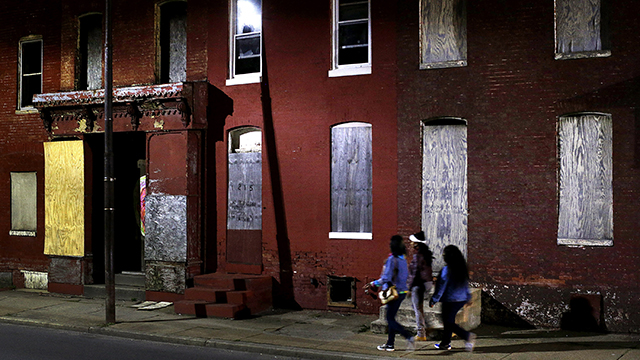This post originally appeared at TalkPoverty.org.

In this March 29, 2013 photo, women walk past blighted row houses in Baltimore. Baltimore is far from the worst American city for poverty, but it faces all the problems of cities where vast numbers of the poor now live. The US Census Bureau puts the number of Americans in poverty at levels not seen since the mid-1960s, while $85 billion in federal government spending cuts that began last month are expected to begin squeezing services for the poor nationwide. (AP Photo/Patrick Semansky)
I was five years old when my parents divorced and my father left. My mother faced a stark decision: return to India, where very few people divorced and, as a result, my older brother and I would face stigma that would limit our opportunities; or remain in the United States and find a way to support our family on her own, despite never having worked a day in her life.
We stayed.
We moved out of our middle-class house in Bedford, Massachusetts. Thanks to a state law that fast-tracked mixed-income rental development projects and also a Section 8 federal housing subsidy, we were able to rent an apartment and remain in Bedford, a middle-class town with its good public schools.
I have vivid memories of that difficult time. Checking out at the grocery store, we were the only shoppers in line using food stamps. At school, I was the kid in the cafeteria paying with a voucher for reduced-price lunch. At the welfare office, I remember my mother telling me to “shush” and promising “it would only be a minute.”
“It’s been a lot longer than a minute,” I told her.
“A minute is a figure of speech,” she informed me.
After three years my mother got a job as a travel agent. A couple years later, she was hired as a contracts administrator at Raytheon. By the time I was 11 — six years after we moved into an apartment and turned to the safety net for help — my mother was able to purchase a house for our family. It was a turning point for us, and one that wouldn’t have been possible without a lot of help during the lean years.
My ability to stay in Bedford’s good school system, in particular, changed the course of my life. I went on to attend UCLA and then Yale Law School. I was acutely aware that a lot of nameless public servants had made decisions to expand opportunity and that those decisions had made all the difference for my family and me. So today, I take great pride in leading an institution that at its very core is about expanding opportunities for all Americans. We talk a lot in this town about things like “sequester” and “the debt ceiling” and “target deficit rates” — but to me, public policy basically comes down to this question: is it expanding or contracting opportunity for most Americans?
I believe we have a historic opportunity to address poverty today, because the interests of low-income people and the middle class are converging. Median wages — the wages of middle-income earners — have been stagnant for 12 years. People recognize there is growing inequality in this country and that something is amiss when companies are doing well but people aren’t — when dividends, stock prices and CEO salaries rise but wages don’t.
And while we have a clear opportunity to make the connection between the interests of people in poverty and the interests of the middle class, we have our work cut out for us. Conservatives have successfully pitted people in the middle against people struggling near the bottom. They are skilled at exploiting economic anger and anxiety, fear and distrust. For example, they have convinced many Americans that many people who turn to the safety net want to be on welfare rather than having a job. This mistaken notion is particularly troubling right now, when the hardest-hit communities face high unemployment rates of 20 to 30 percent. Conservatives say we have to break up the safety net or people won’t pursue jobs. But the truth is those jobs just don’t exist right now. So the real effect of these heartless policies will be more people hungry, more people homeless and more children with fewer opportunities to succeed — children just like my brother and I.
For my family, as for many American families, the safety net was a bridge that carried us through hard times. That’s why it’s important that I tell my story.
Among some on the center left, there is a political strategy to not talk directly about poverty. Many will say things like “trying to get people to the middle class.” I think that strategy is a mistake. If we fail to talk openly about poverty, we miss an opportunity to address people’s anxieties and misconceptions about low-income people. We fail to correct the misunderstandings about who poor people are, and we fail to make progress we otherwise could.
That is why at the Center for American Progress we work hard to speak clearly and directly about poverty, and to ensure the conversation isn’t an abstract debate, but one about real people. So we support the Half in Ten campaign to reduce poverty by half over 10 years — just as we did from 1964 to 1973 — which engages people to tell their stories about what the safety net meant for their lives, just as I tell mine. Our new TalkPoverty.org blog features contributors living in poverty today write about the struggles they face. Teams as diverse as housing, healthcare, education, budget and tax policy are working hard to determine the impact of policy decisions on people in poverty or at-risk of falling into poverty. (And let’s remember, there are now 106 million Americans — more than 1 in 3 of us — either living in poverty or on less than $37,000 annually for a family of three, which is a single hardship away from poverty.)
When we take on the assumptions and stereotypes directly — and actually look at the lives of poor people — we see in fact that their lives are full of struggle (including the struggle to navigate a welfare system that seems designed to make it as hard as possible for people to receive benefits).
Recently, I testified at a Senate HELP committee hearing on ways to improve the economic security of working women in America. One of the other witnesses on the panel was Armanda Legros. Ms. Legros was 6 ½ months pregnant when she pulled a stomach muscle at work. The doctor told her no more heavy lifting and gave her a written note for her employer, but the employer refused to comply. So Ms. Legros lost her job and had to go on unemployment insurance and food stamps. She is a perfect example of a person who wants to work but is forced to turn to the safety net. Her story is also a perfect example of the kinds of struggles low-income workers face in the workplace every day. We need to give more low-income people the opportunity to tell their stories at congressional hearings, so our elected officials see the true face of poverty in America, and I applaud the Senate HELP Committee for providing Ms. Legros a platform.
It’s time for a new focus on the solutions to poverty, both in the November elections, and during the presidential election in 2016. To force the issue to the forefront of the national conversation, advocates in Washington and in communities across the country will need to mobilize and speak out. People will need to raise the issue at town halls just as we did for health care reform. We all need to stand with workers who are fighting for better wages and working conditions and give them opportunities to tell their stories. It’s not a question of whether change will come from the grass roots or Washington — we need to fight for good policy in Washington and raise our voices at the state and local levels.
We’re all in the same boat now, searching for economic stability for our families and an economy that raises wages for everyone. It’s time for us to make that case clearly and unapologetically. There are many times when we miss opportunities in public policy. We can’t miss this one.


